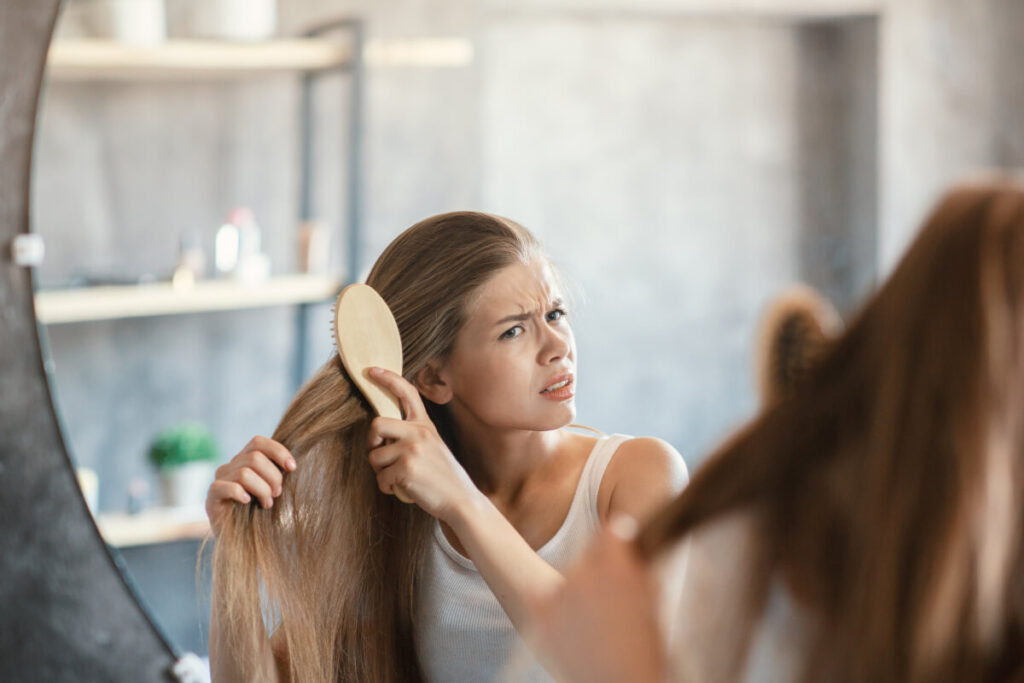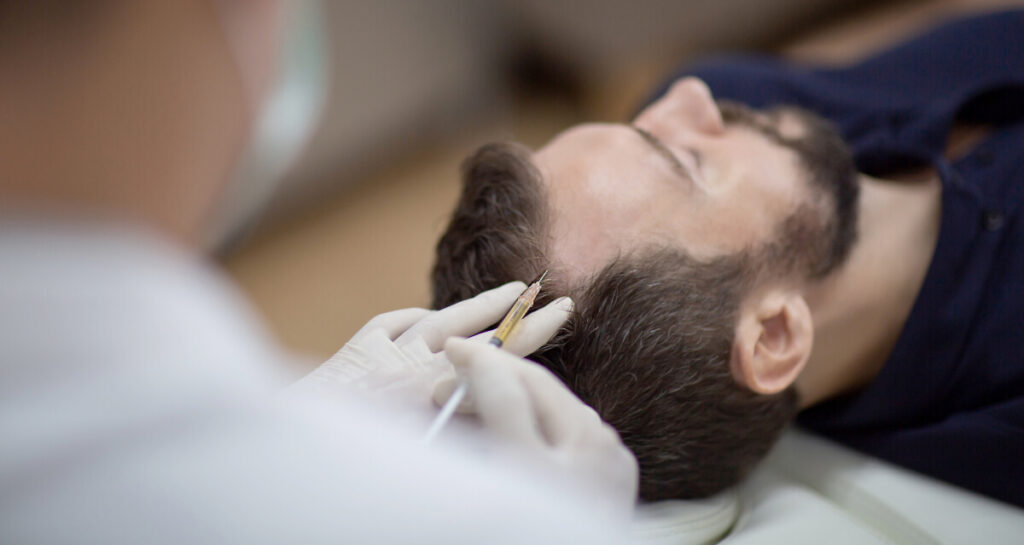Nutritional deficiencies can result in various symptoms because of how the lack of nutrients affects your regular bodily functions. One solution to treat this is to take dietary supplements. But when it comes to hair, there might be some supplements that are believed to cause hair loss,, with one of these being iron.
So what happens if your hair loss gets worse after starting iron supplements, and why? Iron supplements don’t cause hair loss. This can actually be a sign of an underlying issue causing hair loss that iron supplements didn’t contribute to, and can’t treat either. Here’s what you should know.
Can Iron Supplements Cause Hair Loss?
No, iron supplements don’t cause hair loss. In fact, it’s actually the opposite: there is a link between iron deficiency (or anemia) and hair loss. Taking supplements to treat this can reduce these effects and improve hair quality. If you’re experiencing hair loss after taking iron supplements, it may be due to another underlying condition.
Iron Deficiencies and Hair Loss
Doctors aren’t sure why, but some people who have anemia also experience hair loss. One reason may be because iron is essential to creating ribonucleotide, an enzyme that helps with cell growth. Another reason, though more research is needed, it’s believed to be because of iron’s function in our blood.
Iron is a part of our blood and helps red blood cells carry oxygen to different parts of your body, including your scalp. Anemia, combined with poor circulation and blood pooling, can make it difficult to transport blood to your scalp and hair follicles.
Hair follicle cells can be sensitive to low levels of iron, which can prevent it from growing new cells. This can result in hair growth slowing down or your hair follicles becoming weaker and leading to hair loss.
That’s why, if a person is anemic, hair loss and poor hair health may be attributed to their iron deficiency. Your doctor may recommend you take iron supplements for up to six months to bring your iron levels back to normal.
For those who are severely anemic, your doctor may recommend iron injections especially if you have medical conditions like Crohn’s disease, which can affect your ability to absorb nutrients from food. Your doctor may also recommend dietary changes; rather than taking iron supplements, you’ll be recommended to eat foods rich in iron, such as red meat, chicken, fish, leafy green vegetables, and more.
Can Iron Supplements Promote Hair Growth?
If you have an iron deficiency, it may be possible for your hair quality to improve once your body has achieved normal iron levels. However, there’s not enough evidence to suggest iron supplements can promote new hair growth if you have anemia.
It’s also not recommended that you take iron supplements for hair growth if you’re not anemic. Excess iron can have negative effects on your body, so it’s best to consult a doctor before taking iron supplements.
Other Possible Causes and Types of Hair Loss

If you’re taking iron supplements and you notice hair loss, there may be two reasons to explain it. First, if it’s anemia that’s causing your hair loss, you may have to wait several months to see any improvement. Supplements can take time to have an effect on your body.
Second, you may have another underlying condition that’s causing hair loss, not just your iron deficiency. It’s possible that your type of hair loss may be caused by any of the following:
1. Other Nutritional Deficiencies
If you don’t have an iron deficiency, it’s possible that you have any other nutritional deficiency that’s causing poor hair health. Later in this article, we’ll talk about several nutritional deficiencies that may have an effect on your hair. Like anemia, these deficiencies can be treated with a change in diet or by taking supplements.
2. Androgenetic Alopecia
Also known as male or female pattern hair loss, this is a genetic condition where you can experience gradual hair loss. This can happen any time after puberty, though it’s more common for men later into adulthood and for women after menopause. Minoxidil can be used to slow down or stop hair loss, but it’s not a permanent hair loss solution. There is currently no cure for hereditary hair loss.
3. Pregnancy
Women who are pregnant may experience faster and thicker hair growth while carrying their child. This is due to higher estrogen levels in your system. After giving birth, however, your estrogen levels will return to normal, and you may start to experience hair loss. This naturally resolves itself within a year after giving birth.
4. Telogen Effluvium
Your hair naturally sheds in a growth cycle. However, your hair may remain in the telogen or shedding phase longer than normal, causing drastic hair loss. This can be caused by factors such as stress, weight loss, thyroid issues, and certain types of medication. This is only temporary, but your doctor may prescribe medicine to prevent this.
5. Anagen Effluvium
Unlike telogen effluvium which sheds hair in the actual shedding phase of your hair’s cycle, anagen effluvium causes hair to fall out during the growth phase. This can be caused by factors like chemotherapy, fungal infections, and autoimmune diseases.
6. Medications
Certain medications can cause hair loss. This includes:
- Blood thinners
- Birth control pills
- Accutane
- Antidepressants
- Beta-blockers
- Cholesterol-lowering drugs
Check with your doctor if there are alternative medications you can take to avoid hair loss or if reducing your dosage can prevent it from affecting your hair.
7. Traction Alopecia (Tight Hairstyling)
This type of hair loss is most common for women and men with long hair. Tight hairstyles like buns, braids, and extensions can pull hair by the roots and cause hair to break, which can eventually lead to bald spots and hair thinning. This can easily be treated by avoiding tight hairstyles like cornrows, box braids, or by simply pulling the hair all the way back, as this causes further damage to your hair.
8. Hair Treatments
Exposing your hair to frequent heat treatment (such as flat irons, curlers, etc.) can affect your hair’s health. Excess use of harsh chemicals can also damage your hair. Mild cases of hair treatment can be fixed by salon treatments and haircare products. More severe cases, however, may not be fixable, and the most practical solution may be to trim off damaged hair and grow new hair in its place.
Potential Hair Loss Treatments

You can have both hair loss due to another reason on top of an iron deficiency. If this happens, treating your iron deficiency alone may not fully treat your hair loss, so you might have to seek alternative treatment for hair loss from a dermatologist. They may recommend the following options:
- Minoxidil – this can be used as a topical solution or be taken orally, though the latter will require a doctor’s prescription. This isn’t a permanent solution, but taking this medication can keep your hair in the growth phase.
- 5-alpha-reductase inhibitors – these can help increase the enzymes associated with hair growth.
- Hair transplants – this is a surgical procedure that can restore your hair prior to your hair loss.
- Platelet-rich plasma (PRP) injections – this is a treatment where your blood is extracted, processed to isolate the plasma, and then injected onto areas in your scalp. These platelets can stimulate cell repair and growth, which can help you achieve longer, thicker hair.
- Lifestyle changes – your doctor may recommend a different diet, hair care products, or stress management practices to reduce the preventable causes of hair loss.
Supplements You Can Take to Improve Your Hair
Aside from iron deficiencies, other nutritional deficiencies may cause poor hair health. Taking supplements may improve the quality of your hair, but the effects of those who take supplements without deficiencies can vary. Excess nutrition can lead to negative effects, so it’s best to consult with a healthcare professional before taking any of these supplements:
- Vitamin A – creates sebum, your body’s natural oils which can keep your scalp and hair moisturized.
- Biotin – plays a role in creating keratin, a protein that’s the building block of healthy hair.
- Vitamin C – an antioxidant that blocks free radicals from premature aging your hair. Vitamin C can also help produce collagen, which is essential for healthy hair, and help your body absorb iron more efficiently.
- Vitamin D – though its role in hair growth is unknown, low levels of vitamin D are linked to hair loss.
- Vitamin E – an antioxidant that can prevent oxidation, which can prematurely age your hair.
- Zinc – essential for hair tissue growth and repair by keeping your sebaceous glands and hair follicles healthy.
Visit FACE Med Store for Your Beauty and Wellness Needs
Iron supplements can help those with anemia. While there’s no guarantee that iron supplements can improve your hair, it’s unlikely to worsen hair loss. If you’re experiencing hair loss while taking iron supplements, it may be either because your body still doesn’t have enough iron, or you have another underlying cause that iron supplements can’t treat. Check with your healthcare provider to see what might be the reason behind this.
Visit FACE Med Store for all your beauty and wellness supplies, tools, and other products. We cater to both aesthetic practices looking to cut costs without compromising results and client satisfaction, as well as everyday users looking for great deals on beauty tools they can use at home. Check out our online store today.
Read More: How Fast Does Your Hair Start Growing After H2G Hair Growth Supplements?






